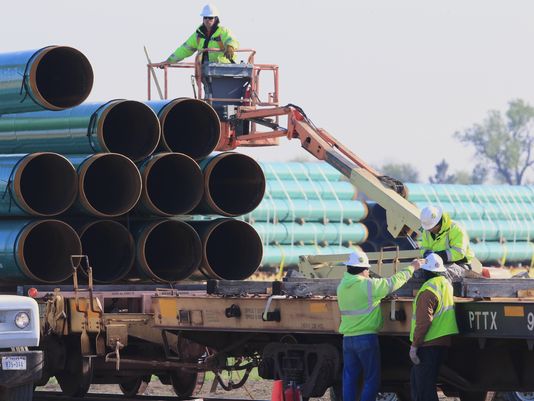A Houston-based company building the Bakken oil pipeline through 18 Iowa counties has developed contingency plans to battle snow, ice and sub-freezing temperatures, if necessary, during construction of the project.
The Des Moines Register reports, Dakota Access LLC, a unit of Energy Transfer Partners, said earlier this year it hoped to begin work on the underground pipeline no later than May 17 to avoid winter construction. But the Iowa Utilities Board didn’t give a go-ahead for most of the work until June 6, and the U.S. Army Corps of Engineers didn’t verify environmental compliance in Iowa until July 26. The pipeline will transport crude oil through a 30-inch-diameter pipeline from North Dakota’s Bakken oil fields to a distribution hub at Patoka, Ill.
Dakota Access officials said last week they planned to move forward with construction in Iowa as quickly as possible to limit work on the project to one crop growing season, and they still hoped to have the pipeline in service by the end of the year. However, the Iowa Utilities Board had already ordered Dakota Access to develop plans for winter construction.
Iowa Utilities Board spokesman Don Tormey said the board’s staff will review the winter construction plans and present a report to the board. But Lisa Dillinger, a Dakota Access spokeswoman, said Wednesday there has been no change to the company’s plans and the winter construction document was submitted to Iowa regulators as part of the permitting process.
The winter plan discusses working in snow and cold weather, including stripping frozen topsoil with equipment capable of accurately removing variable depths of soil. It also proposes suspending final cleanup activities and topsoil placement if stockpiled soil is frozen and cannot be uniformly distributed across the right-of-way. In places where restoration cannot be completed over the winter, the right-of-way would be left in a rough condition to reduce potential for erosion during snow melt.
Erosion control devices would be installed and efforts would be made to stabilize soil and remaining soil stockpiles left over the winter or for more than seven to 21 days, depending upon slopes. Trenches would be backfilled with unfrozen soil as practical, the plan suggests. The final cleanup schedule would vary, depending upon ground conditions and time of construction. In addition, when thawing occurs, construction activities could be suspended in unsuitable areas until conditions are appropriate or until alternatives are identified.
Wallace Taylor, lawyer for the Iowa chapter of the Sierra Club, which opposes the pipeline, said his initial impression is the winter construction plan appears too general and lacks detail. Secondly, the plans aren’t specific enough in defining adverse winter weather conditions, he added.
Chad Carter, business agent and vice president for Operating Engineers Local 234 in Des Moines, said he’s heard that Dakota Access is still hoping to finish most work by Oct. 31 on the Iowa segment of the four-state pipeline. That would include installing the pipe in trenches and backfilling dirt, allowing the pipeline to become operational, but not including cleanup work, he said. But Carter anticipates more workers will be needed to expedite construction in Iowa.
Cold and snow can be significant concerns late in the construction season, said Carter, who has worked on pipeline construction projects in the past.
“When you have three feet of frost, you really can’t rip into the ground just to take a foot, and when the stockpile of dirt is so frozen that you can’t spread it anymore, you are just spinning your wheels,” Carter remarked.




